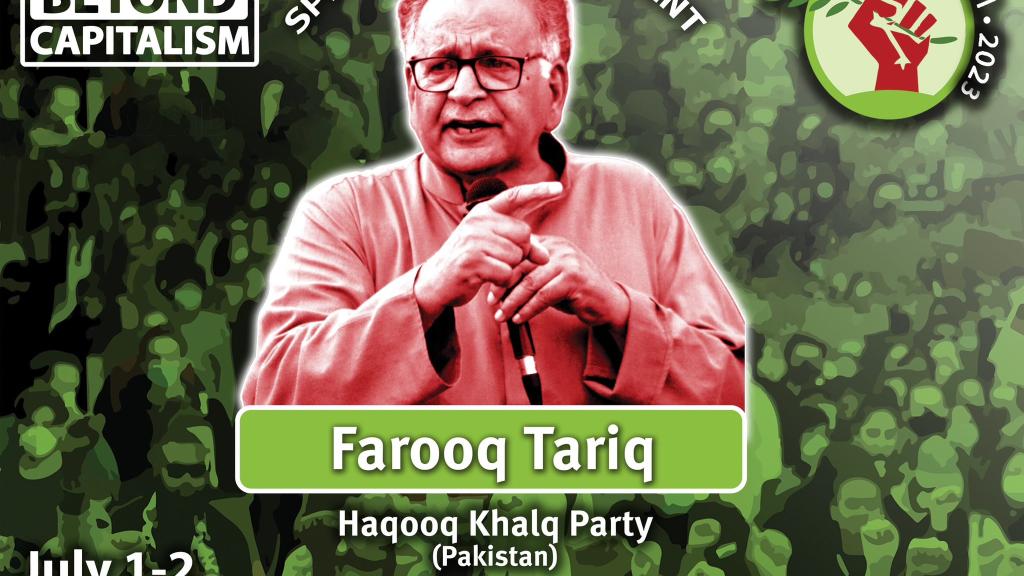Farooq Tariq (Pakistan): Imran Khan arrested, what next?

[Editor's note: Farooq Tariq, Haqooq Khalq Party president and a leading activist in the climate justice movement in Pakistan, will be speaking at Ecosocialism 2023 over July 1–2 in Naarm/Melbourne, Australia. For more information about the conference, visit ecosocialism.org.au.]
The situation in Pakistan is highly unstable and volatile, with political and economic crises intensifying and exacerbating each other. The recent arrest of Imran Khan, the former prime minister and leader of the Pakistan Tehreek Insaaf Party, has triggered violent reactions from his supporters, leading to attacks on military installations and civilian buildings. The military, which had previously supported Khan, showed restraint to the violence, but has also vowed to take legal action against those involved in the attacks.
Imran Khan came to power in the 2018 general elections that were alleged to be rigged in his favor by the military establishment. Their relationship broke down after 2020 due to several factors. Khan’s personality was more self-centered and egotistic, leading to clashes with military generals over the appointment of high officials. Moreover, the economy was not growing, leading to mounting economic pressures on both sides. While Khan refused to normalize relations with India, the military commander-in-chief saw it as a key strategy. Khan also held a sympathetic view of the Taliban government in Afghanistan and tried to cozy up to the head of the ISI to split the army’s loyalty. Khan repatriated over 5000 Pakistani Taliban from Afghanistan under the guise of rehabilitation, a move opposed by military generals. He was in favor of negotiating with the Taliban government in Afghanistan, leading some to speculate that he wanted to become a better version of the Taliban than the original.
Imran Khan’s differences with the military on key issues, such as the economy, India-Pakistan relations, and the Taliban government in Afghanistan, seem to have contributed to his downfall. His adventurist strategy to counter his arrest has backfired, leading to widespread arrests of his party activists and the party being on the run. In his bid to become Prime Minister again, Khan dissolved his own provincial governments in Punjab and Khyber-Pakhtunkhwa—two important provinces in the Pakistani federation, but his moves were thwarted by the present government and military establishment by delaying elections.
Developments so far
On May 9th, the day Imran Khan was arrested, ten people were killed, and most of the country, including the motorways, remained closed. This well-planned violent response, as the present government alleges, was the result of Imran Khan’s instructions to his leaders and cadre. The government further alleges that Imran Khan hoped to trigger a violent response from the military establishment by asking his supporters to directly confront them. His plan, as the government suggests, was to destabilize the regime to the point where the military takes over the government and declares martial law.
On May 10th, the military issued a press statement declaring May 9th as the black day in Pakistan’s history, announcing a restrained response to the burning of their buildings and warning that they would not tolerate any future attacks. Legal action has also been taken against those involved in the violent actions.
Wholesale arrests of PTI activists have been carried out throughout Pakistan, with most of the party’s main leaders arrested. Murder and attempted murder cases have been registered under anti-terrorist laws. The PTI party is now paying dearly for its adventurist strategy to counter its leader’s arrest, and the party is on the run. However, small groups of PTI supporters continue to carry out burning vehicles whenever possible, but the mass response to the arrest has disappeared.
What's in the offing?
With increasing deployment of violence and military’s intervention in civilian affairs, it seems that the future for democratic forces in Pakistan does not bode well. With the excuse to maintain law and order, the military’s control over civilian affairs will increase. The stifling of dissent will continue and free speech will be criminalized and working classes of the country will be further pushed to poverty.
It must be noted that there is no fundamental contradiction between Imran Khan and Pakistan’s powerful military establishment. Khan is simply trying to cajole or coerce the military establishment to get him back to the seat of power. In order to do that, Khan in his previous government tried to strengthen the military. His government passed a notorious law criminalizing any criticism of the armed forces, which is now being used against him. During his tenure as Prime Minister, he used Pakistan’s anti-corruption watchdog, National Accountability bureau, to witch-hunt his opponents. Today, the same NAB is being used against him.
The collapse of the economy, coupled with the corona and climate disasters, has led to severe poverty and inequality in Pakistan. The implementation of neoliberal policies and the dominance of the military in civilian life are likely to further shrink democratic space and exacerbate poverty and inequality in the country. Ordinary people are likely to bear the brunt of the power struggles and political crises in the country.
The palace-intrigues between Pakistan’s political elite and military establishment has worsened the economic conditions in the country. Strengthening democratic forces would require a complete overhaul of the system including policies that favor the people. Pakistan’s elite consumeRs 27billion of subsidies to sustain their lifestyle. Any political force that doesn’t challenge such gross inequality will continue to be in cahoots with the military establishment, furthering the economic poverty of its people.